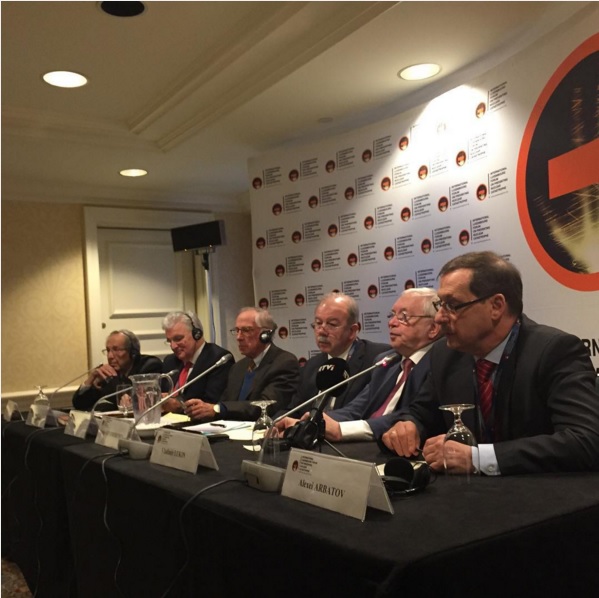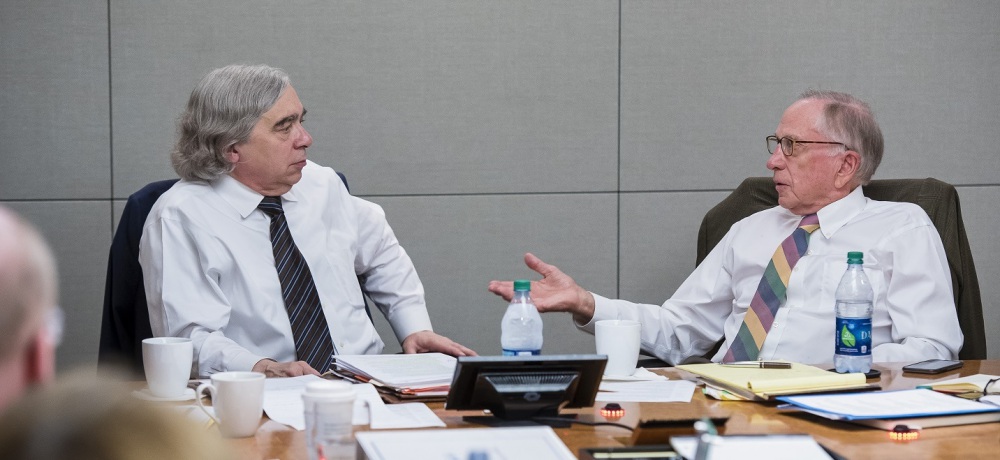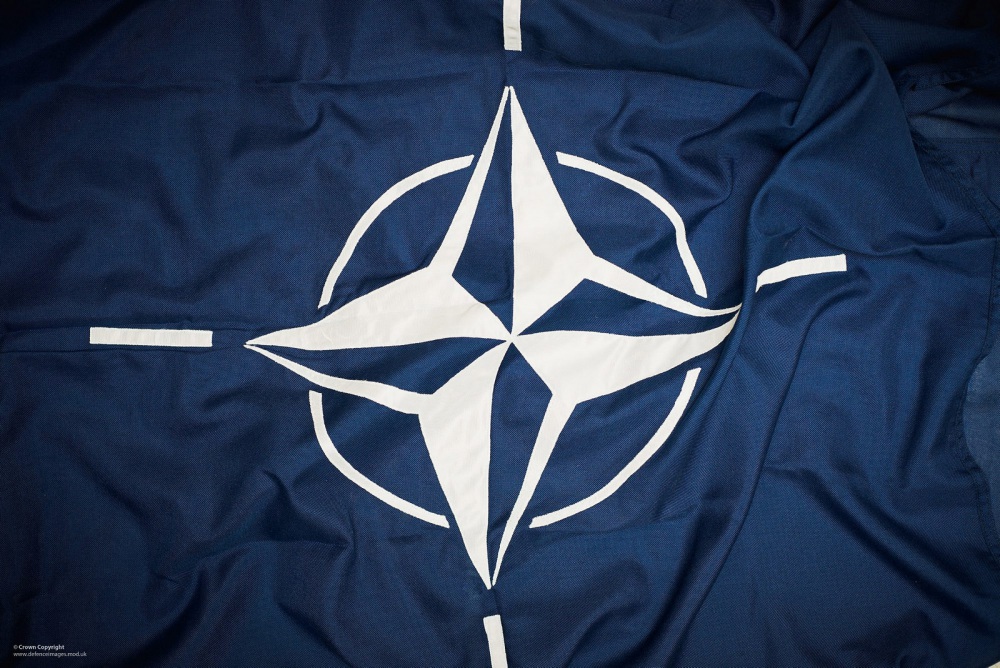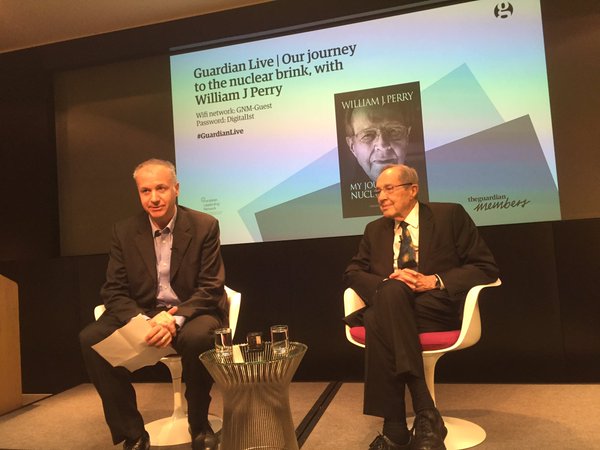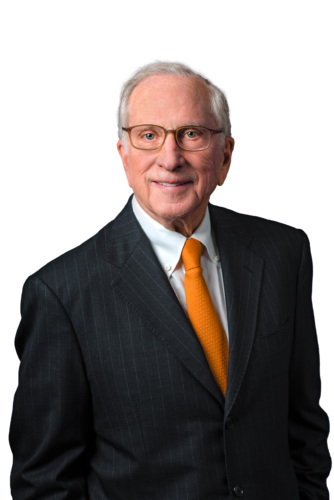
Sam Nunn
Co-Founder and Co-Chair, NTI
Recognizing that the interests, perspectives, and actions of the West and Russia diverge in Ukraine and Syria, it should be emphasized that the U.S. and Russia continue to share interests in reducing the risks of nuclear war, terrorism and proliferation. Indeed, as the possessors of the world’s largest nuclear arsenals and longstanding leaders of the nuclear nonproliferation regime, the U.S. and Russia have special responsibilities to cooperate on nuclear matters even when they clash on other matters.
As a matter of highest priority, there is an urgent and immediate requirement to rebuild U.S.-Russian relations. Because of the nuclear dangers that haunt their relationship, this reconstruction should include a new declaration reconfirming their common view of nuclear war – that it cannot be won and must never be fought. The US and Russia should revive and strengthen all channels of communication. Dialogue can no longer be treated as a bargaining chip. Continuous dialogue is essential between political, military and intelligence leaders through direct bilateral channels and the NATO-Russia Council.
Tensions between the United States/NATO and Russia are exacerbating an already profound crisis of nuclear arms control, disarmament, and non-proliferation. Despite a few important examples of cooperation such as the 2010 New START Treaty and the Joint Comprehensive Plan of Action on the Iranian nuclear program, the state of affairs on nuclear issues remains bleak. US-Russian dialogue across a range of security threats and arms control issues has broken down, multilateral cooperation for nuclear arms control and disarmament has been impaired, and existing arms control measures are jeopardized.
Today there is no agreed process or agenda for next steps on nuclear disarmament and risk reduction between Russia and the United States, who between them still possess over 90% of the world’s nuclear weapons. While nuclear arms control is dormant, international crises put serious pressures on US-Russian relations and raise concerns about nuclear risk. Dangerous military incidents have occurred and official statements emphasizing nuclear capabilities have implied the possibility that nuclear weapons might be used, reviving fears of possible military conflict that could potentially lead to nuclear escalation between Russia and the U.S.
Stepping back from this dangerous ledge will require the urgent joint effort of the leaderships of the two biggest nuclear powers and their allies. They should recall the wisdom of former Soviet and U.S. leaders who, during the Cold War, managed to cooperate to prevent nuclear catastrophe even during profound crises in relations. Starting in 1963, they reached a number of agreements that led to joint statements articulating the belief that “a nuclear war cannot be won and must never be fought.” In the ensuing fifty years these agreements laid the groundwork for significant success in nuclear arms control.
Today, the leaders of Russia, the United States, and their European allies should draw on that history and work to avoid the catastrophe of global nuclear war, which could be triggered even by limited and selective use of nuclear weapons. These threats are all growing, as is the threat of nuclear terrorism by groups such as ISIS.
An important and necessary step in addressing nuclear dangers is discussion on the dangerous “prompt-launch” or “hair-trigger” status of strategic missiles—a perilous posture inherited from the Cold War. In addition, it is imperative to avoid the possibility of launch by accident, miscalculation or sabotage. Reducing nuclear risks should be at the top of the agenda — even as the crises over Ukraine, Syria and the flow of refugees to Europe demand serious attention.
Leaders should recall that, in the past, each time a new U.S.-Soviet or U.S.-Russian nuclear arms control agreement was signed, the parties immediately started negotiations for the next one. Presently, five years after approval of the 2010 New START Treaty, there are no negotiations underway or expected. At the same time, the Comprehensive Test Ban Treaty has not entered into force, the Intermediate-range Nuclear Forces Treaty is under threat, and the Conventional Forces in Europe Treaty is not being implemented. Important negotiations are deadlocked and cooperative steps that would improve the security of all parties are on hold. At a moment of friction and conflict when restraint is needed, arms control is failing; trust is being eroded precisely when it is most needed.
Consequently, we urge Presidents Putin and Obama, hopefully joined by their principal allies, to do the following:
Today we find ourselves in a race between cooperation and catastrophe. Consequently, leaders must begin this work immediately. Because of growing tensions across the globe, renewed and enhanced dialogue is essential. No security architecture, no set of rules, no efforts to negotiate or implement agreements can succeed without leaders who are committed to addressing core issues and who are willing to cooperate. It is their obligation as leaders to work together to build a safer world for all our citizens.
Members of the Joint Conference of the International Luxembourg Forum on Preventing Nuclear Catastrophe with the Nuclear Threat Initiative:
1. James ACTON Co-Director of the Nuclear Policy Program, Carnegie Endowment for International Peace (United States).
2. Steve ANDREASEN National Security Consultant to the Nuclear Threat Initiative (former Director for Defense Policy and Arms Control, White House National Security Council, United States).
3. Alexey ARBATOV Deputy Chairman of the Organizing Committee, International Luxembourg Forum; Member of the Board of Directors, Nuclear Threat Initiative; Head of the Center for International Security of the Primakov Institute of World Economy and International Relations (IMEMO), Russian Academy of Sciences (RAS); Scholar-in-Residence of the Carnegie Moscow Center (former Deputy Chairman of the Defense Committee of the State Duma, Federal Assembly – Russian Parliament); Academician, RAS (Russia).
4. Robert BERLS Senior Advisor for Russia and Eurasia, Nuclear Threat Initiative (former Special Assistant to the U.S. Secretary of Energy for Russia/NIS Programs), Ph.D. (United States).
5. Andrew BIENIAWSKI Vice President for Material Security and Minimization, Nuclear Threat Initiative (United States).
6. Hans BLIX Member of the Supervisory Board of the International Luxembourg Forum (former Director General of the International Atomic Energy Agency), Ambassador, Ph.D. (Sweden).
7. Linton BROOKS Non-Resident Senior Adviser of the Center for Strategic and International Studies (former Under Secretary of Energy for Nuclear Security and Administrator of the National Nuclear Security Administration), Ambassador (United States).
8. Des BROWNE Vice Chairman and Member of the Board of Directors, Nuclear Threat Initiative; Member of the Supervisory Board of the International Luxembourg Forum; Founder and a Current Member of the Top Level Group of Parliamentarians for Nuclear Disarmament and Non-Proliferation (former Chairman of the Board of Trustees and Directors of the European Leadership Network for Multilateral Nuclear Disarmament and Non-Proliferation; Secretary of State for Defense; Secretary of State for Scotland; Member of Parliament), Lord Browne of Ladyton (Great Britain).
9. Jayantha DHANAPALA
Member of the Supervisory Board of the International Luxembourg Forum, President of Pugwash Conferences on Science and World Affairs (former United Nations Under-Secretary-General for Disarmament Affairs), Ambassador (Sri Lanka).
10. Anatoliy DIAKOV Researcher (former Director), Center for Arms Control, Energy and Environmental Studies, Ph.D. (Russia).
11. Vladimir DVORKIN Chairman of the Organizing Committee, International Luxembourg Forum; Principal Researcher of the Primakov Institute of World Economy and International Relations (IMEMO), RAS (former Director of the 4th Major Institute of the Ministry of Defense), Professor, Major-General, ret. (Russia).
12. Alexander DYNKIN Director of the Primakov Institute of World Economy and International Affairs (IMEMO), RAS; Member of the Presidium of the Presidential Council for Science and Education; Member of the Presidential Commission on the development strategy of the fuel and energy complex and the environmental safety; Member of Presidium, Russian Academy of Sciences; Academician Secretary of the Division for Global Issues and International Relations, RAS (former Economic Adviser to the Prime Minister of Russia); Academician, RAS (Russia).
13. Susan EISENHOWER
President of the Eisenhower Group (United States).
14. Rolf EKEUS
Member of the Supervisory Board of the International Luxembourg Forum; Member of the Board of Directors, Nuclear Threat Initiative (former High Commissioner on National Minorities at the OSCE; Chairman of the Governing Board, SIPRI), Ambassador (Sweden).
15. Kelsey HARTIGAN Senior Program Officer for Material Security and Minimization, Nuclear Threat Initiative (United States).
16. Viatcheslav KANTOR, President of the International Luxembourg Forum on Preventing Nuclear Catastrophe, Ph.D. (Russia).
17. Susan KOCH Independent Consultant (United States).
18. Nikolay LAVEROV Member of Presidium, Russian Academy of Sciences; Member of the Supervisory Board of the International Luxembourg Forum (former Deputy Chairman of the Council of Ministers of the USSR, Chairman of the State Committee of the USSR Council of Ministers for Science and Technology); Academician, RAS (Russia).
19. Robert LEGVOLD, Marshall D. Shulman Professor Emeritus, Department of Political Science and the Harriman Institute, Columbia University (United States).
20. Vladimir LUKIN Member of the Supervisory Board of the International Luxembourg Forum, Professor of the National Research University – Higher School of Economics (former Chairman of the Committee on International Relations and Deputy Chairman of the State Duma, Russian Federation; Ambassador of the Russian Federation to the United States of America; Commissioner on Human Rights for the Russian Federation).
21. Steven MILLER Director, International Security Program; Editor-in-Chief, International Security; Member of the Board, Belfer Center for Science and International Affairs, John F. Kennedy School of Government, Harvard University (Cambridge, United States).
22. Sam NUNN Co-Chairman, Chief Executive Officer, and Member of the Board of Directors, Nuclear Threat Initiative; Member of the Supervisory Board of the International Luxembourg Forum (former Chairman of the Armed Services Committee and the Permanent Subcommittee on Investigations of the U.S. Senate).
23. Robert NURICK, Senior Fellow of the Atlantic Council (former – Director of the Carnegie Moscow Center, United States).
24. Sergey OZNOBISHCHEV Deputy Chairman of the Organizing Committee, International Luxembourg Forum; Head of the Section of the Primakov Institute of World Economy and International Relations (IMEMO), RAS; Director of the Institute for Strategic Assessments; Professor of the MGIMO (University), Ministry of Foreign Affairs of Russia (former Chief of the Organizational Analytic Division, RAS), Ph.D. (Russia).
25. George PERKOVICH Vice President for Studies – Global Security and Economic Development and Director of the Non-proliferation Program at the Carnegie Endowment for International Peace, Ph.D. (United States).
26. William PERRY Professor of Stanford University, Member of the Supervisory Board of the International Luxembourg Forum (former Secretary of the U.S. Department of Defense), Ph.D. (United States).
27. Samantha PITTS-KIEFER Senior Program Officer for Scientific and Technical Affairs, Nuclear Threat Initiative (United States).
28. William POTTER Director James Martin Center for Non-proliferation Studies and Professor of Non-proliferation Studies, Monterey Institute of International Studies, Ph.D. (United States).
29. Leon RATZ Program Officer for Material Security and Minimization, Nuclear Threat Initiative (United States).
30. Tariq RAUF Director, Disarmament, Arms Control and Non-Proliferation at the Stockholm International Peace Research Institute (former – Head, Verification and Security Policy Cooperation at the IAEA, Coordinator, Multilateral Approaches to the Nuclear Fuel Cycle, IAEA), Ph.D. (Canada).
31. Joan ROHLFING President and Chief Operating Officer, Nuclear Threat Initiative; Member of the U.S. Department of Defense Threat Reduction Advisory Committee; Member of the Council on Foreign Relations (former Senior Advisor for National Security to the U.S. Secretary of Energy).
32. Roald SAGDEEV Distinguished University Professor, Department of Physics at the University of Maryland; Director Emeritus of the Russian Space Research Institute; Member of the Supervisory Council of the International Luxembourg Forum; Academician, RAS (Russia/United States).
33. Page STOUTLAND Vice President for Scientific and Technical Affairs, Nuclear Threat Initiative, Ph.D. (United States).
34. Ellen TAUSCHER Member of the Board of Directors, Nuclear Threat Initiative (former Congresswoman, Under Secretary of State for Arms Control and International Security Affairs, United States).
35. Andrew WEBER Member of the Council on Foreign Relations (former Assistant Secretary of Defense for Nuclear, Chemical and Biological Defense Programs, United States).
36. Isabelle WILLIAMS Senior Advisor of the Nuclear Security Project, Nuclear Threat Initiative (United States).
Sign up for our newsletter to get the latest on nuclear and biological threats.
NTI Board Co-Chairs Secretary Ernest J. Moniz and Sen. Samm Nunn Publish Article on the Nuclear Arms Race in Foreign Affairs
Senior NTI leaders call for NATO to demonstrate a willingness to engage Russia on both differences and areas of potential cooperation and seek to reduce tensions in a region that remains central to global security.
Perry addressed the future of nuclear weapons in the United States and his concerns about current modernization plans.
